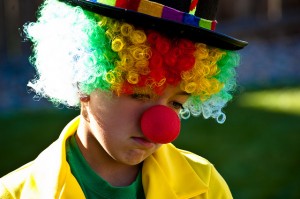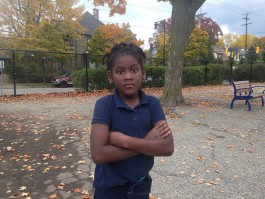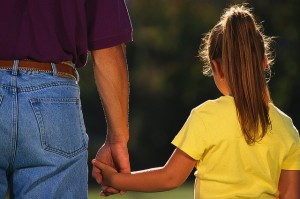Is My Child Depressed?
 We tend to associate being a child with being carefree, and not with depression. But depression and mental health challenges are far from just for adults.
We tend to associate being a child with being carefree, and not with depression. But depression and mental health challenges are far from just for adults.
In the UK, the Office of National Statistics suggests that 1 in 10 children suffer a mental health condition, with at least 4% of this number suffering anxiety and depression.
What are the signs of depression in children? And when should you be concerned about your child or consider hiring a child psychotherapist?
7 SIGNS YOUR CHILD MIGHT BE DEPRESSED
Children can be more emotional than adults, and a certain amount of mood swings is part of being a kid. So how can a parent tell if their child is depressed, or just a typical child with ups and downs as they navigate growing up?
 1. Your child is exhibiting emotional responses that are not usual for him or her. Are they more irritable than you’ve seen them? Moping about and not wanting to play with their toys?
1. Your child is exhibiting emotional responses that are not usual for him or her. Are they more irritable than you’ve seen them? Moping about and not wanting to play with their toys?
2.Their moods are lasting much longer than usual. or are changing far too quickly. If they were always the sort to have a quick temper tantrum but be fine an hour later, but suddenly seem stroppy for entire afternoons, it can be a sign your child is suffering anxiety or depression. So can incessant rapid changes in mood.
Don’t think that just because your kid isn’t sad he or she isn’t depressed. While adults tend to be down when depressed, children can instead become more frustrated and irritable than usual, perhaps because they don’t have the experience or understanding to describe how they are feeling.
3. Their unusual behaviour goes on for weeks. Depression is, if anything, persistent. Normal moods come and go. Depression goes on for weeks or months.
4. Their behaviour doesn’t seem connected to circumstance. If they are sad and weepy but tell you they don’t know why, or if they are angry with a sibling who has  done nothing wrong, it might be a red flag. While normal grumpiness relates to an obvious incident, depression and anxiety can cause irrational emotional swings and outbursts that don’t seem based on anything.
done nothing wrong, it might be a red flag. While normal grumpiness relates to an obvious incident, depression and anxiety can cause irrational emotional swings and outbursts that don’t seem based on anything.
5. Your child’s emotions are affecting their functioning on a daily basis. Have teachers reported changes in their focus or ability? Do they seem uninterested in their hobbies or friends, are they socially withdrawing? Seem oversensitive to rejection? Depression in children, like for adults, often causes one to struggle with things they once enjoyed and to feel oversensitive around others.
6. They are using a depressed perspective and phrases of doom and gloom. Children can be dramatic, naturally. But pay attention for changes in what your child talks about. For starters, does it match what is really happening to them? Are they telling you that nobody likes them even when their friends are calling them? Then look for expressions of low confidence, such as ‘I am no good at anything’, or ‘nothing good ever happens to me’. And like adults, kids, too, can have thoughts around death when depressed, saying things like ‘I wish I had never been born’.
7. Your child is exhibiting regressed behaviour. Are they suddenly whining, clinging, or otherwise acting less independent than usual? Are they sucking their thumb again, or even using babytalk? Wetting the bed again for the first time in years?
In summary, signs of depression in children can include:
- changes in moods and behaviour that are unusual for them
- moods that go on far longer than they used to
- emotional outbursts with no apparent cause
- sharing a depressed viewpoint or dark thoughts they are having
- lack of interest in activities they once enjoyed
- struggling with day-to-day functioning
- not wanting to be around other children
Depression and anxiety also cause physical signs. Ones to look out for in your child include:
- a drop in appetite
- sleep problems including nightmares, restlessness, and insomnia
- constantly tired in the daytime despite sleeping
- complaints of sickness which doesn’t respond to treatment or a doctor can’t substantiate including stomachaches, headaches, and general aches and pains
- development of or an increase in a nervous habit like thumb sucking or nail biting
- bedwetting
What causes depression in children?
Often it can be a series of things working together to leave your child depressed. This can include challenging life events, a stressful environment, a genetic pre-disposal to depression, or a sudden biochemical disturbance.
 School can be a very difficult environment for some children that can lead to low self-esteem and then depression. Issues that can arise can include bullying, peer pressure, and anxiety over tests and grades.
School can be a very difficult environment for some children that can lead to low self-esteem and then depression. Issues that can arise can include bullying, peer pressure, and anxiety over tests and grades.
It’s now common knowledge that divorce can cause real stress for children, but it’s not the only change in family life that can lead to a child with anxiety and low moods.
Any major change in their family life can deeply upset a child, including moving home, a parent or sibling with a serious illness, or a bereavement. Even if your child claims they are fine, they might not be, as many children can be too concerned with not upsetting their parents further to be honest if they are worried or confused.
And if a major trauma occurs to a child, such as physical abuse, the anxiety and depression can surface quickly of several years later.
Children with a parent who suffers from depression are at a 25% greater risk than other children of developing depression. If both parents have suffered from depression, that raises to a 75% chance they too will have issues with their moods. So if so if you or your partner have a history of emotional issues it is something to consider.
What should I do if I think my child is depressed?
First of all, don’t blame them – or yourself. Parenting is difficult, and growing up is difficult.
Your positive attitude will help your child want to move forward and feel better, whereas if you are stressed, this might make them feel guilty and possibly add to their anxiety.
Instead of blaming yourself and looking backwards at ‘what you could have done’, look forward at ‘what can be done’.
Talk to your child and gently try to find out what has them upset. Try to be as open and calm as possible, and try to see things from their perspective.
 Don’t trivialise what they share. Even if to you what they are upset over seems silly, to your child, it might be something very overwhelming.
Don’t trivialise what they share. Even if to you what they are upset over seems silly, to your child, it might be something very overwhelming.
The very act of letting your child know you are there for them and that they are loved can go a long way to help alleviate their distress.
The issue might actually be something simple that you can sort out with your child.
If you are still worried, seek support and help. You can book an appointment with your GP who can refer you to the appropriate mental health care professional. This can include counseling for your child, family therapy, or Cognitive behavioural therapy.
Or, consider privately sourcing a child psychotherapist or child psychologist. They will be trained in unique ways of working with children that can include art, sand, and play therapy.
Look for a therapist who is registered with the appropriate professional bodies (in the UK this is the ACP and the ACHIPPP, respectively). And consider sourcing a therapist who has substantial experience (for example, at Harley Therapy, we only hire therapists with a minimum of five years of post-graduation practice under their belt).
Why therapy matters if your child is depressed
Depression left untreated has been found to actually affect the shape of the brain in a way which means your child might have increasing troubles regulating emotions as they get older. This might lead to a greater risk of substance abuse and problem behaviour as a teenager. So with children, early diagnosis and treatment of depression is important.
Not only does therapy give your child someone safe to talk to that they don’t have to worry about upsetting, it also gives them valuable life skills. This includes learning to problem solve, learning to communicate, learning to handle stress, and learning to understand how they feel. Investing in therapy for your child might not only help their depression, but boost their confidence and set them up to more easily and happily navigate their upcoming adolescent years.
Do you have experience or advice about being the parent of a depressed child that you would like to share? Do so below, we love hearing from you.
Images by Shawn Campbell, Steve Depelo, Catnapping, TheeErin, Spirit Fire





I have been abused by every person in my family, father tried to have sex with me when I was fourteen years old and because of my mother’s friends older sons when I was eight I knew what my father was trying to do, and my first encounter with sexual abuse was when I was just three years old by a neighbor of my grandmother it was a female and I did not remember this abuse until I was twenty years old. After the abuse that happened with my father I told everything to everyone in my family, grand mother and father, my mother’s sisters and my grand mother’s sister and my mother, to found out two years later that no beloved me and I was more hurt by that and not being ale to tell my mother what had happened to me as a young little girl. I began to be a sexual deviant. I did not care about sex it was nothing to me. I guess my brothers did not believe me because they became physically abusive. I felt unprotected so I told myself to let it go and things would be alright but I was wrong because the man that I loved turned on me after dating at a young and than getting married and having a family. My husband abused me physically, mentally, emotionally and financially for more than thirty years. Once I was away from all my abusers due to death or just getting away from all the hurt my oldest son abused his brothers and sister verbally and physically and me verbally and now I have to stay with him because of poor health and my other children left me in the street because they renege on their promises and financial agreements and my friends abuse me by having sex with my husband and telling me I was not a good friend only because I no longer wanted to live a reckless life being thirty with children grown folks responsibilities.
Now that I have nothing for my old age and owing the government. I don’t like myself and I am not blaming anyone I just want to feel better but the way I feel I can get better is to leave my son’s home.
Signed
I need to love again for real
PS I am confused because I always wanted and open dialogue with all my abusers and I had thought that mental health is very important.
What do I do now.
Hi Patricia, what an awful lot of things for one person to go through. We are sorry to hear all this. And you are brave to have managed this far. Regarding your question about ‘open dialogue with abusers’, it’s not at all a safe idea when you are feeling traumatised to attempt open dialogue with abusers.If anything it’s a form of self abuse where you open yourself up to rejection, as you experienced. If we approach abusers from a state of anger and pain we accuse and attack them, and their natural instinct will be to defend themselves, not turn around and go ‘you are right sorry’ unless they themselves have been to years of therapy. It’s a much better idea to seek professional support and work through all your pain and trauma for yourself first. Then, when/if you are ready, you can open dialogue with abusers from a space where you are feeling stable. Many victims of trauma find that actually, when they get to that point, they aren’t even interested in opening a dialogue. Mental health has nothing to do with talking to people who have wronged us or abused us. It’s about making choices that feel right for us personally. And learning to take care of ourselves in the here and now, live from our power instead of our victimhood, raise our self-esteem, learn how to set boundaries, learn how to set goals and work towards creating the life that works for us personally. So if we go through all our pain and hurt and feel we don’t want to look back, we don’t have to. It’s our personal choice. Hope that helps.